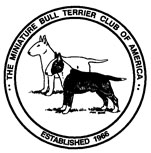|
GENETICS AND HEALTH COMMITTEE REPORT - November 13, 2000
LENS LUXATION PROJECT:
Nothing new to report. If one of your Minis should luxate and you have
not yet sent in a blood sample from that dog, please be sure to send one
along with the necessary pedigree information to Dr. Johnson's lab at the
University of Missouri. Of course, all Minis should be represented in our
research effort, whether or not they have luxated. Sad to say, a dog, which
seems normal this week may luxate next week. If all of our Minis were
registered with this project, we would have a much better idea what percent
of our bred is affected, the ages when the luxation occurs, and most
importantly, the families most seriously affected. There are still far too
many Minis who are not included in the study. I think there must at least be
several hundred!
NEW AKC HEALTH FOUNDATION GRANT:
In the last issue of " A Little Bull," I reported that our club was
investigating the possibility of supporting another research project. The
club has agreed to support this new endeavor, which will cost the club $2500
per year for two years. This is less expensive than Dr. Johnson's study
because most or all of the ten breeds involved should be helping to support
it.
GRANT#2012: DEVELOPMENT OF PCR MULTIPLEXED CANINE
MARKER PANELS FOR THE PURPOSE OF GENOME SCREENING AND LINKAGE ANALYSIS
Principal Investigator: Marcia Eggleston, PhD
Research Facility: Veterinary Genetics Lab, University
of California, Davis
Since the title of this project is rather
daunting and cumbersome, I'll refer to it in the future simply as "Dr.
Eggleston's project." I have had a pleasant phone conversation with Dr.
Eggleston in which she cheerfully answered my questions. The major reasons
for selecting the Bull Terrier and the Miniature Bull Terrier to represent
the Terriers are:
1. Both breeds are already supporting research on breed problems
thought to be genetic in origin. (Obsessive/Compulsive Disorder in Bull
Terriers and Lens Luxation in Mini Bulls);
2. Both breeds already have a good base of DNA samples at the
Veterinary Genetics Lab because of the cheek swabs from our dogs that many
of us sent in two years ago. (When the lab is ready to receive additional
samples, they will send out more kits so that we can send in cheek swabs
from dogs that were not included in the initial samples. Cheek swabs are
so easy to do, that everyone can easily obtain them. The only expense
should be the stamp required to mail them in!)
3. Both breeds are known to suffer from disorders thought to be
genetic in origin. Deafness, kidney disease, and heart problems are three
that are all too familiar.
The Miniature Bull Terrier is now definitely
included in the study. In the original proposal, the Mini would have been
included "if time permitted."
The grant proposal is very technical and
difficult to understand. The purpose of the study is to find DNA markers
which will identify those animals which are genetically programmed to either
develop a genetic disorder themselves or to pass it on to their offspring.
When such animals can be identified breeders can avoid doubling up on
genetic flaws. We could greatly reduce the incidence of all hereditary
defects if only we knew in advance who carried what defective genes.
Anything learned in a project such as this can only bring us closer to the
day when such genetic screening is possible and practical.
 |
